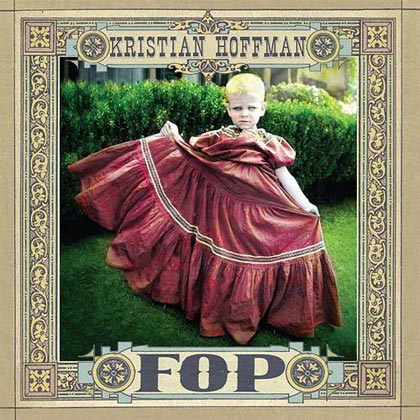Kristian Hoffman, Fop
Published on October 5th, 2010 in: Current Faves, Music, Music Reviews, Reviews |By Hanna and Matt Keeley

Kristian Hoffman is perhaps best known for working with the brilliant Klaus Nomi; he was Nomi’s musical director and the wordsmith behind Nomi’s original songs. If you’ve sat down with the records, you know how good those songs were and still are, both in performance (there’s a reason Nomi’s one of Rush Limbaugh’s favorites) and in songwriting. Nomi should have conquered the world; instead, he died too early.
Hoffman, on the other hand, didn’t sleep, and has been working with loads of cool people, including James White and the Contortions, Rufus Wainwright, Sparks, Lydia Lunch and. . . look, this’ll just be a laundry list of who’s who in good music, so just rest assured: if they’re talented, he’s probably worked with ’em. He’s also done solo records, of which Fop is the newest. It’s such an event that Popshifter enlisted TWO, count ’em TWO, reviewers to cover it.
Hanna: Overall, the album to me has a simply beautiful, symphonic quality, rather like the glammy, prog bands of the ’70s, such as David Werner or Alistair Riddell or the Metro album. It fit in so well in my playlist that I had not even noticed that some of the songs I was enjoying were actually from this album. Which is not to say that it sounds old fashioned, because the keen edge of the background melodies is far sharper and more modern than anything achieved in the past.
The first track, “Something New Is Born,” with its sweeping, vivid lyrical and musical language is the epitome of the beauty of this album. It’s got epic structure and greatness, but is simultaneously full of detail and little motifs that capture the attention again and again. Wildean lyrics (“so utterly utter”) and mentions of butterflies complete the image of Aestheticism.
Matt: “I Can’t Go There With You” is just a bouncy, happy shiny piece of power-pop, if power-pop can contain a harpsichord, anyway. It’s just a perfect song: big drums and guitars, neato backing vocals, and, the harpsichord. That’s a really underused instrument or, more likely, synth voice. Either way there’s a reason why Lurch was drawn to it.
Hanna: “Cassandra” is more classical, with background synths and the Weimar Republic sound rather like Hoffman’s more well known earlier pop work. This sound later recurs on “Out Of The Habit,” all feeling and tinkly parlour piano.
Matt: “Evil” fits in well with “Can’t Go There” as it’s a bit more ’70s AM radio, maybe even with a slice of late ’60s garage thrown in the mix. . . and the harpsichord is back so, A+, Mr. Hoffman.
When “Imaginary Friend” kicked in, it dawned on me one of the reasons I love this album so much: it’s like if Roger Manning joined Sparks in time to make Indiscreet. It’s got that throwback sound to early 20th century music from both sides of the Atlantic, along with the bombast and sheer rock of the ’70s, making radio safe for power pop fans around the world.
Hanna: “Mediocre Dream,” “Stay,” and “My Body It” are also pure power-pop rock, with clapping effects and choirs and soaring choruses and guitar solos. The lyrics are more self aware and clever than is at first apparent from the breezy music, dealing with ageing, alienation, and self-fulfillment.
Matt: Yet it’s not all rock: “Blackpool Lights” is a beautiful ballad. Piano driven, it’s a show-off for Hoffman’s great pipes as well as his songwriting ability. It actually sounds as if it could be slotted in perfectly on the Hedwig & The Angry Inch soundtrack, maybe alongside “Midnight Radio” or “Wicked Little Town.”
Hanna: “Hey Little Jesus” is a burlesque satire on martyrdom and religion. Hoffman’s voice utilizes little flutters and rock & roll hollers, which works well, and it’s probably my favorite vocal performance on the album. As Matt mentioned, Hoffman’s voice is very good elsewhere on this album, too, with a great variety of sound and great harmonies.
The last song, “Strange Seed” is grand, orchestral drums and all. It deals with finding a true identity at a fast pace; it’s quippy and suggestive but especially evocative. It builds up into the great finale this album really deserves and then bursts like a remarkable rocket.
It’s a great and amazingly positive album, with the aesthetic feeling and elegance that is fashionable at the avant-garde forefront. Fop is a real joy.
Matt: I concur with Hanna: Fop is a great, happy album. The odd thing is, for an album called “Fop,” it’s certainly not foppish. (A “fop” record, I’d imagine, would mostly consist of giggling extras from Amadeus occasionally talking about fancy lads.)
I know I’ve said Kristian Hoffman’s LIKE a lot of people in this review and I stand by those comparisons, but the last thing I want to convey is that he’s got no sound of his own.
That is not true. These are great songs, but they are HIS OWN. He’s not jocking anyone’s style here. Kristian Hoffman is his own man, and he’s a rad man.
You want to listen to good music? Listen to Hoffman. If you wanna listen to crappy music? You won’t find it here. But you should listen to Kristian Hoffman anyway, as he might get your head on straight. If he doesn’t, there’s no hope for you.
Fop was released on September 28 via Kayo Stereophonic Records, complete with a 28-page full color booklet. For more information, please visit Kristian Hoffman’s Facebook and MySpace pages, and his website.
One Response to “Kristian Hoffman, Fop”
October 5th, 2010 at 8:41 pm
Kristian Hoffman was not only Klaus Nomi’s wordsmith, he was his TUNESMITH. He wrote the words and music to Klaus’ biggest hits on both the first and second album (RCA). See the documentary “Nomi Song” for more details.
Time limit is exhausted. Please reload the CAPTCHA.